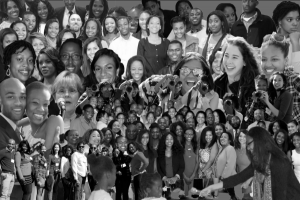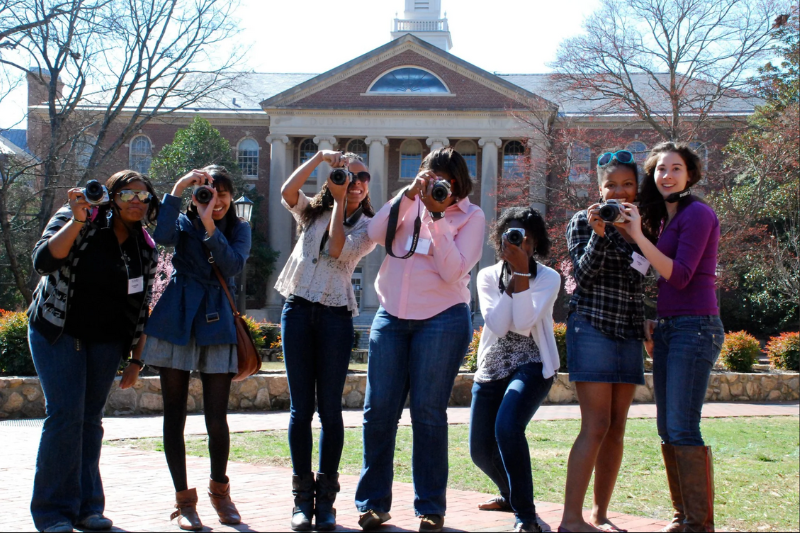NABJ’s 50 years advancing Black journalism, CABJ's history for student leadership

Photos courtesy of the Carolina Association of Black Journalists.
Founded by 44 people on Dec. 12, 1975, the National Association of Black Journalists (NABJ), dedicated to advocating for the advancement and representation of Black journalists and media professionals, will celebrate its 50th anniversary in the upcoming year.
“I think it's just now more than ever, that people are understanding the importance of media – not just media but credible media,” said Eva D. Coleman, region III director of the NABJ’s Southeast region that includes North Carolina. “There's so much chatter that's out there and it's not kind to Black people and people of color.”
Coleman's role as an NABJ regional director is to oversee and advocate for members in over 30 professional and student chapters across 11 states, including the Carolina Association of Black Journalists (CABJ) at the UNC Hussman School of Journalism and Media.
She said what she loves about student chapters is that they are well trained, informed and fierce in today’s news world.
“I think that when we look at patterns and changes in technology and all of the things, it's important to note that what does not change is the necessity for the truth to still be told,” said Coleman. “And so when we look at student chapters … I'm so excited because, ‘Yes, we still have hope for our industry.’”
Coleman said she knows CABJ through its adviser Trevy McDonald '92 (M.A.), '95 (Ph.D.), UNC Hussman associate professor and associate dean of access, belonging, inclusion, diversity and equity (ABIDE).
“I know the efforts that she does with students on the campus. And sometimes you kind of look at it as knowing the leadership and knowing the adviser and knowing Trevy's commitment to NABJ,” said Coleman. “That's a trust factor that I know that that student chapter is in darn good hands, and they will be guided in a way that is supportive and encouraging.”
“Without diversity there is no excellence” is CABJ’s motto. Founded in 1991 by former UNC journalism professor Harry Amana, CABJ has maintained chapter-status for 33 years. Chuck Stone, former journalism professor at UNC, was one of the founders of NABJ and its first president. Stone became the Walter Spearman Professor at UNC in 1991. He taught censorship and magazine writing until retiring in 2004, having earned many awards in his career including NABJ’s Lifetime Achievement Award. In his honor, UNC Hussman now offers scholarships and other opportunities such as the Chuck Stone Program for Diversity in Education and Media.
Throughout the years, CABJ itself has been honored with numerous NABJ awards, including Student Chapter of the Year awards in 2001, 2002 and 2007 in addition to nominations for the award in 2005 and 2012.
UNC Hussman students who have won the NABJ Student Journalist of the Year include Averi Harper ’13, now with ABC News; Giulia Heyward '21 (M.A.), now with The New York Times; and Doni Holloway ’18, now with Bloomberg News.
UNC Hussman alumni who have earned recognition as the NABJ Journalist of the Year are The Miami Herald’s Jacqueline Charles ’94 in 2011 and 2022 and The New York Times Magazine’s Nikole Hannah-Jones ’03 (M.A.) in 2015.
Alumna Linda Florence Callahan ’74 was named Journalism Educator of the Year in 2014 for her work at N.C. A&T State University. Rochelle Riley ’81 and John C. Watson ’06 (Ph.D.), have each been honored with the prestigious NABJ Ida B. Wells Award. Riley was also inducted into the NABJ Hall of Fame in 2021.

Members of CABJ.
McDonald, who earned NABJ’s Outstanding Book Award in 2019, is a long-standing NABJ member who has advised the CABJ since 2010, but said she has been a “chapter mom” since 2007. She shared her praises of the work this year’s CABJ students have made.
“They've done a lot of events that are both fun and educational, as well as networking and internship opportunities for them,” McDonald said, adding that she is confident that their efforts warrant consideration for NABJ’s student chapter of the year. “I do believe that they are doing the caliber of work and programming that makes them worthy,” McDonald said.
Professor-Emerita Jan Yopp, who co-advised the CABJ for 21 years until her retirement in 2020, said the NABJ has been a big part of CABJ’s identity.
“Obviously with Association of Black Journalists as part of the name, and with so many CABJ members going on to become members of NABJ — it has just continued to strengthen that tie over the years,” said Yopp.
Yopp said something she’s noticed is that after CABJ members graduate and join the journalism profession, they often reach back, support and mentor other students coming through the school.
“It kind of comes full circle. They're a member of CABJ, they get out into the profession, they reach back – that becomes a role model for the current students who then graduate and do the same thing,” said Yopp. “So they really have created this circle of support that is really really amazing and probably unique to most student organizations on campus.”
Nia Satterfield Brown, a junior studying media and journalism and sports administration while minoring in Hispanic studies, is the current CABJ president. She said she joined CABJ when she was a freshman to find community.
“It’s so important that we diversify our newsroom… [and] have access to resources and programming,” said Satterfield Brown.
Satterfield Brown added that many companies prefer to hire from universities known to have a high caliber of students.
“In regards to UNC Hussman, we’re one of the top programs in the country,” she said. “It’s so important to bring back alumni of the program to share their knowledge and expertise in their respective fields.”
Following her own graduation, Satterfield Brown said it would feel disrespectful to be an alumna and not help students in the same way.
Coleman said that student journalists are more important now than ever.
“As journalists, we must ensure the [NABJ founders’] mission stays intact,” said Coleman. “I'm energized by the young people who come forward to want to carry the torch and keep us moving forward.”